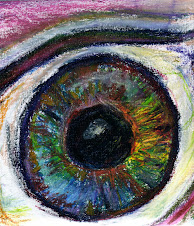Saturday, April 25, 2009
Learning-related Visual Challenges Can Effect Behavior
Students who get very agitated about doing homework, who do not like reading, or who are having serious challenges learning to read may be responding to an undiagnosed visual problem. I see this in the vision therapy context all the time. Children resist doing certain activities by engaging in all types of behaviors that they hope will distract me from continuing to insist on the task. Some children express anger or frustration, even becoming oppositional or somewhat combative. Other children say that they can't do the activity because it is too hard, too tiring, or too confusing. Still others goof around to avoid actually doing the work. These same strategies happen in the classroom and at home over homework. It can be enlightening for the therapist, teacher, or parent to have a calm conversation with the child. Ask whether the activity is difficult. Then ask why. If the child says that the words move on the page, they can't keep their place, the task is just confusing, or it gives them a headache respect the answer. See if the child can make a distinction between doing the assignment and understanding the material. Don't lead the conversation, though. Just give the child the opportunity to explain the basis for the behavior. Then, instead of making the child push through a task that is overly challenging, give an alternate activity that is more achievable. Talk about better ways to tell the adult that a task is too difficult instead of continuing to utilize the bad behavior as an avoidance strategy. Of course, if your child gives you any indication that their resistance to visual tasks is because of how difficult it is for them to cope with the visual information, make an appointment with a developmental optometrist in your area. First, rule out any need for corrective glasses. Then, rule out any eye movement deficits, eye teaming problems, visual processing delays, and visual motor integration deficits or delays. All of these issues can make school very overwhelming to an otherwise bright child. All of them can be addressed using a specific program of vision therapy under the supervision of a developmental optometrist who incorporates vision therapy in their practice setting.
Tuesday, April 14, 2009
MidWest Home School Convention in Cincinnati, Ohio
The publisher of my Eye Can Too! Read series of graded academic activities for homeschoolers that are designed to improve a student's learning-related visual skills will be at the MidWest Home School Convention this week. Home School Incorporated will have copies of the books at their booths: #737 and #836. The convention will be held at the Duke Energy Center in Cincinnati starting on Thursday, April 16, and going through Saturday. There is a fee to attend the convention but the vendor booths are worth the trip and the expense because you'll get the chance to look at the curriculum items before you buy them and there are always convention specials and discounts. If you want to learn more about this convention, check out www.cincinnatiHomeschoolConvention.com.
Friday, April 10, 2009
Does Your Child Have a Head Tilt?
This could be a sign that your child favors one eye over the other. She may tilt her head because each eye may have a different visual acuity at near or in the distance. Perhaps she sees better and clearer with one of her eyes.
Another cause of your child's head tilt could be the result of a convergence insufficiency or a convergence excess. These conditions may indicate that she is having difficulty teaming both eyes together without experiencing blur or double vision. Her coping strategy could be to suppress the visual information received by one eye, shutting it off, in effect, by tilting her head.
If your child has always experienced these visual conditions, she may not even realize that it is abnormal.
So, if your child has a head tilt, don't scold her about her posture until after you take her to a developmental optometrist for a comprehensive eye exam. She may need glasses or a program of professionally supervised in-office vision therapy. You can find a developmental optometrist in your area at www.covd.org by plugging in your zip code.
Another cause of your child's head tilt could be the result of a convergence insufficiency or a convergence excess. These conditions may indicate that she is having difficulty teaming both eyes together without experiencing blur or double vision. Her coping strategy could be to suppress the visual information received by one eye, shutting it off, in effect, by tilting her head.
If your child has always experienced these visual conditions, she may not even realize that it is abnormal.
So, if your child has a head tilt, don't scold her about her posture until after you take her to a developmental optometrist for a comprehensive eye exam. She may need glasses or a program of professionally supervised in-office vision therapy. You can find a developmental optometrist in your area at www.covd.org by plugging in your zip code.
Thursday, April 2, 2009
Comprehensive Free Eye Exams for Infants
Do you know a baby who is under 12 months old? A comprehensive absolutely free grant-funded eye exam is available from optometrists nation-wide under the InfantSee Program. Check out www.infantsee.org. At the top of the home page there is a link to help you find a participating optometrist in your area. This is a much more extensive vision evaluation than your baby's pediatrician will conduct. Not only a check of the baby's eye-sight and ocular health, the exam investigates whether your baby's functional vision is developing properly. Optometrists who are participating in the InfantSee Program are likely to also incorporate vision therapy in their practice or else know a colleague who does. This is a wonderful program that no one should miss.
Subscribe to:
Posts (Atom)




